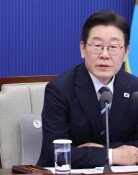AI technology to become closely integrated into our daily lives
AI technology to become closely integrated into our daily lives
Posted September. 14, 2023 08:18,
Updated September. 14, 2023 08:18
Starting next year, the government is set to invest 909 billion won to accelerate the adoption of artificial intelligence (AI) in areas that directly impact people’s lives, such as safety and welfare. The government has unveiled plans to develop technology to counter the negative consequences of generative AI services that spread misinformation.
This announcement was made during the 20th Emergency Economy and Livelihoods Meeting and the “Conference on Making the ROK an AI Superpower,” where the Ministry of Science and ICT briefed President Yoon Suk Yeol.
President Yoon emphasized the importance of government support as the driving force for businesses to invest actively and take on challenges. He highlighted the pivotal role of private entities in South Korea’s quest to become an AI superpower. The meeting was attended by major corporations such as LG, KT, SK Telecom, Naver, and Kakao, all actively involved in developing advanced AI technologies.
The Ministry of Science and ICT outlined its primary goal of democratizing AI technology across society, including everyday life, industries, and public administration. As part of this effort, the existing real-time AI-based forest fire detection system, currently limited to just four high-risk municipalities, will expand to 50 by 2025. This system employs AI-powered CCTV cameras to swiftly detect wildfires, even from the smallest sparks or smoke. A nationwide AI-driven automatic flood forecasting platform will be established at 223 locations, including rivers and control stations. This platform will provide timely flood predictions. Artificial intelligence will play a role in prioritizing emergency calls to the 119 hotlines based on urgency.
In the realm of welfare, the government will develop and distribute AI-powered unmanned pet robots for individuals over the age of 65. Furthermore, AI-powered curator robots will be introduced in museums across the country.
Additionally, the government is actively working on strategies to mitigate the adverse impacts of AI technology development and its expanding applications.
“False information can spread faster than ever due to AI and digital technology, posing a threat to liberal democracy and the market economy, jeopardizing our future and that of the next generation. Regulations on AI should prioritize the well-being of all humanity,” emphasized President Yoon.
To ensure the trustworthiness of AI technology and services, particularly in critical sectors like energy, transportation, and nuclear power, the Ministry of Science and ICT will develop a mechanism for authenticating their credibility. Funds will also be allocated to address issues related to biases, hallucinations, and AI-generated abusive content.
In the near future, the ministry will introduce a “Digital Bill of Rights” that encompasses regulations for advanced digital services, including generative AI. Lee Jong-ho, the Minister of Science and ICT, expressed South Korea’s ambition to lead in regulating AI-powered systems through establishing this Digital Bill of Rights, aimed at bolstering the ethical standards and reliability of AI technology.
warum@donga.com · dapaper@donga.com



![연금 개시 가능해지면 年 1만 원은 꼭 인출하세요[은퇴 레시피]](https://dimg.donga.com/c/138/175/90/1/wps/NEWS/IMAGE/2026/02/20/133390850.4.jpg)



